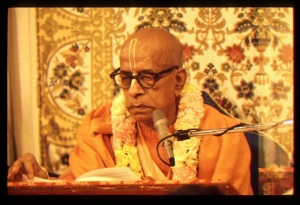CC Madhya 19.188: Difference between revisions
No edit summary |
(Vanibot #0054 edit - transform synonyms into clickable links, which search similar occurrences) |
||
| Line 17: | Line 17: | ||
<div class="synonyms"> | <div class="synonyms"> | ||
''pañca-rasa'' | ''[//vanipedia.org/wiki/Special:VaniSearch?s=pañca&tab=syno_o&ds=1 pañca]-[//vanipedia.org/wiki/Special:VaniSearch?s=rasa&tab=syno_o&ds=1 rasa]'' — five direct transcendental mellows; ''[//vanipedia.org/wiki/Special:VaniSearch?s=sthāyī&tab=syno_o&ds=1 sthāyī]'' — permanently existing; ''[//vanipedia.org/wiki/Special:VaniSearch?s=vyāpī&tab=syno_o&ds=1 vyāpī]'' — expanded; ''[//vanipedia.org/wiki/Special:VaniSearch?s=rahe&tab=syno_o&ds=1 rahe]'' — remain situated; ''[//vanipedia.org/wiki/Special:VaniSearch?s=bhakta&tab=syno_o&ds=1 bhakta]-[//vanipedia.org/wiki/Special:VaniSearch?s=mane&tab=syno_o&ds=1 mane]'' — in the heart of a devotee; ''[//vanipedia.org/wiki/Special:VaniSearch?s=sapta&tab=syno_o&ds=1 sapta] [//vanipedia.org/wiki/Special:VaniSearch?s=gauṇa&tab=syno_o&ds=1 gauṇa]'' — seven indirect mellows; ''[//vanipedia.org/wiki/Special:VaniSearch?s=āgantuka&tab=syno_o&ds=1 āgantuka]'' — accidental; ''[//vanipedia.org/wiki/Special:VaniSearch?s=pāiye&tab=syno_o&ds=1 pāiye]'' — appearing; ''[//vanipedia.org/wiki/Special:VaniSearch?s=kāraṇe&tab=syno_o&ds=1 kāraṇe]'' — under certain conditions. | ||
</div> | </div> | ||
Latest revision as of 22:27, 19 February 2024
Śrī Caitanya-caritāmṛta - Madhya-līlā - Chapter 19: Lord Śrī Caitanya Mahāprabhu Instructs Śrīla Rūpa Gosvāmī

His Divine Grace
A.C. Bhaktivedanta Swami Prabhupada
A.C. Bhaktivedanta Swami Prabhupada
TEXT 188
- pañca-rasa ‘sthāyī’ vyāpī rahe bhakta-mane
- sapta gauṇa ‘āgantuka’ pāiye kāraṇe
SYNONYMS
pañca-rasa — five direct transcendental mellows; sthāyī — permanently existing; vyāpī — expanded; rahe — remain situated; bhakta-mane — in the heart of a devotee; sapta gauṇa — seven indirect mellows; āgantuka — accidental; pāiye — appearing; kāraṇe — under certain conditions.
TRANSLATION
“The five direct transcendental mellows of devotional service are permanently situated in the heart of the devotee, whereas the seven indirect emotions appear suddenly under certain conditions and appear more powerful.